
Fake News MSM: 15 months of lying liars summed up in two tweets

UPDATE 9:18am MST: How dare you question any of this.

Why is it that the CDC insists everyone who already had the rona still must get the jab?
The good news is, 72% of tweeterdom has had enough of their bullshit.


Also, everyone who got the vaxx needs to get the vaxx again, because we don’t know how long the vaxx lasts, plus there are hyper dangerous variants that need to be re-vaxxed. And don’t forget to get your flu shot!
University warns students not to say ‘picnic,’ ‘rule of thumb,’ calling words ‘oppressive’
By Bernadette Hogan, Carl Campanile and Bruce Golding
The rule of thumb at this ultra-woke college is, don’t say “rule of thumb.”
Students and faculty at Brandeis University are being urged to stop using words and phrases like “picnic,” “trigger warning” and even “rule of thumb,” because of what a campus counseling service calls their links to violence and power to “reinforce systems of oppression.”
A compendium of “potentially oppressive language” posted on the school’s website by its Prevention, Advocacy and Resource Center also lists loads of examples of “gender exclusive,” “ableist,” and “culturally appropriative” terminology that “can get in the way of meaningful dialogue.”
The “Oppressive Language List,” first reported by Fox News, was developed recently as part of the PARC’s “Response to Anti-Blackness” program and “is always growing based on suggestions from the community,” according to a web page titled “Holding Ourselves Accountable.”
“As a community, we can strive to remove language that may hurt those who have experienced violence from our everyday use,” the PARC says.
“These recommendations for more-neutral language are brought forth by students who have been subject to violence or who have worked with others who are healing from violence, as well as students who have sought out advanced training in intervening in potentially violent situations.”
According to the Oppressive Language List, the word picnic “has been associated with lynchings of Black people in the United States, during which white spectators were said to have watched while eating.”
A suggested alternative is “outdoor eating.”
“Rule of thumb” can be replaced with “general rule” because the former “allegedly comes from an old British law allowing men to beat their wives with sticks no wider than their thumb.”
And when it comes to “trigger warning” — an alert that spoken, written or recorded material may be alarming to certain people, based on their experiences — possible alternatives include “content note.”
“The word ‘trigger’ has connections to guns for many people; we can give the same head’s up using language less connected to violence,” the PARC says…
https://nypost.com/2021/06/24/brandeis-warns-students-not-to-say-picnic-rule-of-thumb/
Happy birthday, St. John the Baptist: Fraternal Charity and upholding the sanctity of marriage to the point of death
Today is the Feast of the Nativity of St. John the Baptist, born without the stain of Original Sin, thanks to the miraculous grace of his gestational Baptism at the moment of the Visitation. When John leaped in the womb of Elizabeth, at the approach of the Blessed Virgin carrying our Lord in her own womb, John was Baptized in his own amniotic fluid. Pretty cool.
That moment of his Baptism, the Visitation, is the Second Joyful Mystery of the Most Holy Rosary. The fruit of the mystery is Fraternal Charity. St. John loved our Lord, and so he loved the law. The two things go together like a horse and carriage; you can’t have one without the other, as the song goes. As the great Forerunner of Christ, John never suffered from mission creep, and his mission was to point to the truth: Point to our Lord, and point to the Law.
For this he would give his life.
The reason for his beheading was his intransigence on the commandments, which he loved dearly, because he loved our Lord. But I repeat myself. The subject matter in this case was the sanctity of marriage. Fraternal Charity is exactly what St. John was practicing when he rebuked Herod over his adulterous sham “marriage.” St. John laid down his life out of love of our Lord, out of love for His law, AND FOR THE SAKE OF HEROD’S SOUL. That’s Fraternal Charity, folks. We would do well to meditate on this, and pray to be given an ounce of his courage. We are going to need it.
St. John the Baptist, pray for us.
At that time, Herod himself had sent and apprehended John, and bound him prison for the sake of Herodias the wife of Philip his brother, because he had married her. For John said to Herod: “It is not lawful for thee to have thy brother’s wife.” Now Herodias laid snares for him: and was desirous to put him to death and could not. For Herod feared John, knowing him to be a just and holy man: and kept him, and when he heard him, did many things: and he heard him willingly. And when a convenient day was come, Herod made a supper for his birthday, for the princes, and tribunes, and chief men of Galilee. And when the daughter of the same Herodias had come in, and had
danced, and pleased Herod, and them that were at table with him, the king said to the damsel: “Ask of me what thou wilt, and I will give it thee.” And he swore to her: “Whatsoever thou shalt ask I will give thee, though it be the half of my kingdom.” Who when she was gone out, said to her mother, “What shall I ask?” But her mother said: “The head of John the Baptist.” And when she was come in immediately with haste to the king, she asked, saying: “I will that forthwith thou give me in a dish, the head of John the Baptist.” And the king was struck sad. Yet
because of his oath, and because of them that were with him at table, he would not displease her: But sending an executioner, he commanded that his head should be brought in a dish. And he beheaded him in the prison, and brought his head in a dish: and gave to the damsel, and the damsel gave it her mother. Which his disciples hearing came, and took his body, and laid it in a tomb. Mark 6:17-29
Following the Scientists Who Were Destroying America Just to Spite Trump
For the past year and a half of COVID, we have been told by those supposedly in the know, to “follow the science.” Those who question the science are at best called names, like “deniers” or “racists”, and at worst, lose their jobs and reputations, and are banned from social media.
One gets an appreciation for what scientists of centuries ago endured as they questioned science dogma of the day such as the Earth being flat or the Sun revolving around Earth. Such censorship was attributed to the medieval scientific mindset centuries ago long before the enlightened age of Facebook, Twitter, and CNN.
Last year’s outbreak of the Chinese coronavirus allowed the world to travel back in time to an age where sailors feared sailing off the edge of the world into a pit of monsters or nothingness. Instead of being called “flat Earthers” they are called anti-maskers or anti-vaxers. How did we get to such a place where science can’t be questioned, at least science deemed incontrovertible by the government and media?
It started with the climate change movement. Back in the 1970s, we faced a crisis of global cooling. A few decades later it changed to global warming, where the planet would heat up enough to melt the polar ice caps, flooding coastal cities. When these fatalistic predictions failed to pan out, the movement created a new name, climate change, that conveniently covered both warm and cool temperatures, rain, drought, storms, and all other forms of weather, attributing normally changing weather to something nefarious
Scientists are supposed to follow the scientific method, observing natural phenomena, collecting data, forming a hypothesis to explain these observations, then refining the hypotheses as new data emerges. Instead, with both climate science and COVID the process has been reversed, ignoring or jiggering the data to conform with a predetermined hypothesis, rejecting new or contrary data simply because scientists did not like or approve of the source of the contrary data.
The origin of the Chinese coronavirus has been a touchy topic. Dr Fauci and the medical smart set assured us that it came from a wet market and an animal host, despite no such host ever being identified. Ignored was the fact that the city of origin, Wuhan, was home to a bio lab that specifically studied coronaviruses.
Also ignored was that Dr Fauci and his agency were funding, either directly or indirectly, gain of function research into coronaviruses, essentially making them more contagious and/or deadly. Lastly, Dr. Fauci participated in a ‘secret meeting’ with scientists about COVID-19 origins in Feb. 2020, before the pandemic really began, where lab origin was already considered probable.

YouTube screen grab
Even comedian Jon Stewart surprised fellow leftists by recently making an impassioned case that COVID came from the Wuhan lab.
But the scientific community didn’t want to hear of this. Why? Because President Trump suggested the possibility and dared name the virus after its place of origin, calling it the Wuhan flu, which was somehow considered racist. The same scientific community had no trouble with Ebola, Lyme disease, Rocky Mountain spotted fever, German measles, Hong Kong flu, West Nile virus, and a host of other diseases named after their origination point without talk of racism. But Trump didn’t name those other viruses.
Now that Dr Fauci’s past emails have been made public, showing his gain of function funding at the Wuhan lab, all of a sudden, the lab leak hypothesis is gaining traction. Is it because of new science? Or is it because of who is in the White House?
As Forest Gump would say, “just like that,” scientists are now curious over the lab leak hypothesis, after adamantly denying it for well over a year, and want to investigate further, according to a letter published by 18 scientists. As NBC reported,
And while public discussion of a potential lab leak has shifted significantly in recent months, as more people pay attention to a theory that was originally promulgated by former President Donald Trump and his followers, the scientific evidence has remained unchanged, according to interviews with five virologists who have experience in microbiology, infectious disease ecology and viral evolution.
Note “the scientific evidence has remained unchanged”. So what did change? The President changed.
Read more: https://www.americanthinker.com/articles/2021/06/following_the_scientists_who_were_destroying_america_just_to_spite_trump.html#ixzz6ydiuaDak
Follow us: @AmericanThinker on Twitter | AmericanThinker on Facebook
Philly Carmel: “The freedom to maintain their identity as originally promised by the Archdiocese was not being honored”
Follow up from yesterday’s post. Here is the key part of the statement from the Carmelites, explaining why they had to leave the Philly Carmel:
“…the Nuns had been invited by the community and the Archdiocese of Philadelphia with the clear understanding that they were part of a young, thriving, dedicated Order who loved the Extraordinary Form of the Holy Mass and the time-honored traditions of the Discalced Carmelites. As attempts were being made to not only interfere with but to obstruct their way of life, the Nuns tried one way after another to gracefully bow out of this pre-existing commitment. When it became painfully clear that the freedom to maintain their identity as originally promised by the Archdiocese was not being honored, the only option left to the Nuns was to return to the monastery in Valparaiso, Nebraska.”
Contrast that with what the communications director for the Archdiocese told me back in April, when I specifically asked if there had been any interference or coercion with regard to the Latin Mass or the spiritual autonomy of the Carmel:
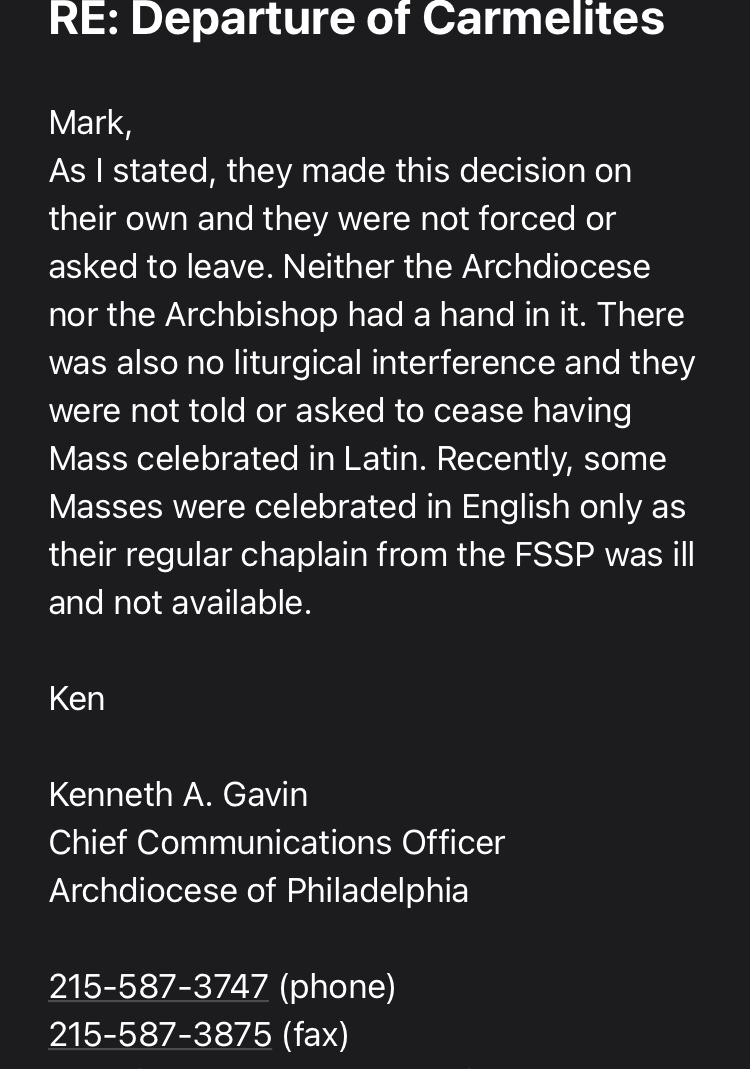
I emailed Ken to ask for a response to the latest news, but I got an out of office reply.
From yesterday’s combox:
James Andrew Dunn says: Why is this Carmelite Association/Federation, the Archdiocese of Philadelphia and now Archbishop Carballo in Rome (Secretary of the Congregation for Institutes of Consecrated Life and Societies of Apostolic Life) so adamant about closing the Philadelphia Carmel? It’s only been a couple of months since the Traditional Carmelites sisters were chased out of the Archdiocese by the Association/Federation. Why can’t they go all out to bring more sisters to that monastery to keep it open? Do they not understand that having a Carmel within the boundaries of a Diocese is literally a gift from God and may very well be what is holding back the hand of chastisement? Seriously, the prayers of devout Carmelites carry 1000x the weight of the prayers of laypeople.The LCWR orders may be dying out but the same is not true for the Carmelites. There’s a growing order of Carmelites in Brooklyn right now who are scared to death in their current environment. Shootings, prostitution and even satanic acts of aggression are happening in a park that abuts their monastery. The good news is that they have been deeded land in northeastern Pennsylvania for a new monastery but the bad news is that their Brooklyn monastery is not theirs and once they leave, it reverts to the Brooklyn Diocese which leaves the Carmelites unable to sell and use the proceeds to build anew. This is public news within the Catholic world and certainly within the greater U.S. Carmelite world. Why can’t the Brooklyn sisters be invited into Philadelphia to at least temporarily reside in that fine monastery until they are able to raise the necessary funds to build their monastery in the northeastern part of Pennsylvania? If the Federation/Association really cared about Mother Pia, they’d be working overtime to find new sisters to join Mother here in Philly rather than bully her into leaving and clo$ing the mona$tery for whatever rea$ons. There are ~10 Brooklyn sisters which the Philadelphia Carmel could easily accommodate. By the way, the Philadelphia Carmel contains FIRST CLASS RELICS of St. Therese of Liseux and her parents. What a grace it would be for a growing order of sisters to live in the presence of those, among many other graces tied to the monastery.I have seen some postings since this story broke that the neighborhood where the Philadelphia Carmel is is dangerous and that’s what drove away the traditional sisters. Well, I live here and can tell you that the neighborhood is not hellish whatsoever. It’s a city neighborhood so things happen but it’s not the heart of North Philly either. Those pushing this lie and saying that the traditional sisters “abandoned Mother” are trying to spin this story from the true villains (the Association/Federation) to the traditional sisters now in Nebraska.Please join me in praying for the intentions of Mother Pia in Philadelphia and for the thwarting of the intentions of the Federation/Association and the Archdiocesan officials who are harassing her and trying hard to clo$e the Carmel for whatever rea$ons.REPLY
C. P. Benischek says: James, For the money. It’s a very valuable property. It’s a land grab.Plus Antipope Francis/Perez (Homosexual Network Strangling the Church) can destroy a traditional Mass outpost simultaneously.Bergoglio’s minions delight in killing. As here, especially two birds w one stone.REPLY
susan says: Yes….they understand that. They COMPLETELY understand that. They are satanic. They are NOT on the side of the Lord and His Church….they are NOT shepherds; they are ravenous wolves.
If you’ve not yet read this, do yourself a favor, take a few minutes, and drink in the wisdom as you swallow the red pill. E.V.E.R.Y. word is true…..https://www.barnhardt.biz/2015/09/17/repost-by-request/REPLY
Patricia says: Dear James, thank you for posting! Totally agree on all counts. I attend the Bklyn Carmel for Latin Mass every Sunday. The only thing you left out is the insane music from the park, and sometimes even the passing cars, and the frequent smell of weed! The park is in full use for parties every weekend. People up to no good know this is a holy place and want to “use” ‘the power’ of the monastery. Please pray for our holy nuns!
I was at Mass in the Philly Carmel this past Fall, for an anniversary of a good priest. I had also left my then 19 year old daughter at Philly Carmel a few years ago while she was discerning. It’s not a similar situation by any means! The Philly Carmel is more similar to a setting in the west side of Manhattan, or the better areas of The Bronx. I believe the Philly Carmel should definitely be utilized! But, wouldn’t the Bklyn OCD face the same risk of oppression that the nuns left behind?REPLYJames Andrew Dunn says: I think they would face the same oppression which is disappointing. In a sane world, a bishop would go out of his way to not lose a growing order of Carmelites. But, we’re nowhere even close to being a sane world. The Archdiocese here didn’t lift a finger to try and bring back the sisters who left for Nebraska. Nor are they doing anything to attract replacement sisters. They want to clo$e the mona$tery and I pray they fail.REPLY
Michael @ The Pilgrim Center, San Sebastian de Garabandal says: Mark Docherty´s Vindication !
BREAKING: Fairfield, PA Trad Carmelites issue statement in response to letter sent from suppressors of the Philly Carmel
I broke the original story on the Philly Carmel back in April, and I will link to those original posts at the end of this one. I’m not going to try to summarize, because there is too much. What is breaking is this first letter, sent today, from the Traditional sisters at Fairfield, who also speak for the sisters of Valparaiso, NE. Every word of this letter is true:
| From: Fairfield Carmelites <fairfieldcarmelites@gmail.com> Date: June 21, 2021 at 2:02:34 PM CDT To: Subject: An Important Update regarding Philadelphia and Elysburg An update to our dear friends… Month of the Sacred Heart June 19, 2021 Dear Friends, Praised be Jesus Christ! We are writing this personal letter to you, all our dear friends, to shed some light on the recent events involving our Carmel of Jesus, Mary, and Joseph. Once we realized there was both misinformation and misunderstanding regarding Elysburg and Philadelphia, we wanted to relate to you the truth of these matters. We hope this letter will be enlightening and helpful. First of all, regarding Elysburg, we made a wholehearted attempt to keep two monasteries open in this diocese by splitting our community in half. This proved too taxing on our Nuns and detrimental to the spiritual welfare of our community. Therefore we have brought all our Nuns to Fairfield. This was the original plan, and it has proven the best plan. We apologize that from your perspective it seemed rushed, but for us it was very much a necessity. While it seemed from the outside that Elysburg and Fairfield were two separate entities, Elysburg was in fact leaning heavily upon our support and direction. We found it increasingly difficult to meet the needs of all our young and vibrant Sisters at both locations. Because of this and because of the exciting prospect of being united in time for the beautiful liturgies of Holy Week and Easter, we accelerated our moving plans. Ideally we would like the Elysburg property to go to another religious group. We had one lined up but it fell through just recently. We will continue to pray that Our Lord will send one to take our place, but we remain at peace with whatever His Will may be. By selling the building, we will be able to reinvest into our present home all the work and donations given during our fruitful years in Elysburg. So while our location has changed a little (same state, same diocese), the community of Jesus, Mary, and Joseph remains faithful to the invitation received from the Diocese of Harrisburg in 2009. Secondly, we would like to dispel any lingering misinformation about our and the Carmel in Valparaiso’s involvement in the departure of the twelve Discalced Carmelite Nuns from the Philadelphia monastery on April 9, 2021. As some of you have noted, the Elysburg monastery closed just about the same time as the Philadelphia Carmel. Because of this, there has been some outside conjecture that the two closures are related. However, the two events were enacted for entirely different reasons and were completely un-choreographed. In July 2017, the Valparaiso Carmel was invited by the small and aging Philadelphia Carmel to help rejuvenate their community. Leaving their beloved Mothers and Sisters and the quiet setting of their monastic homes behind, three of our Nuns from Elysburg and six from Valparaiso undertook this task. Along with the one member of the original Philadelphia community, to whom they became quite close and from whom they received an enthusiastic welcome, these nine Nuns worked together to build a flourishing house of the Lord. However, there was a looming cloud that threatened what we all thought would be a peaceful and fruitful future. For many years, the Philadelphia Carmel had been part of an association. When our Nuns arrived, it was assumed that withdrawing from this association would be a small matter. After all, the Nuns had been invited by the community and the Archdiocese of Philadelphia with the clear understanding that they were part of a young, thriving, dedicated Order who loved the Extraordinary Form of the Holy Mass and the time-honored traditions of the Discalced Carmelites. As attempts were being made to not only interfere with but to obstruct their way of life, the Nuns tried one way after another to gracefully bow out of this pre-existing commitment. When it became painfully clear that the freedom to maintain their identity as originally promised by the Archdiocese was not being honored, the only option left to the Nuns was to return to the monastery in Valparaiso, Nebraska. They did this in the most correct way possible, fulfilling all canonical requirements. Contrary to rumors, April 9th unfolded very quietly at the Carmel in Philadelphia. The Nuns, with smiles and a few tears, took their leave of the original Nun (who wished to remain) and peacefully departed. This Sister’s well-being was, of course, an important concern of the departing Nuns, despite her good health and energetic nature. Therefore, the Mothers in Valparaiso requested that a few of us from Fairfield come to stay in the monastery with her to help in any way necessary. We cooked and cleaned for her, helped her with the sacristy and turn, and arranged for the little ducks and bees to be taken care of. All this we joyfully and willingly did. We only left at her repeated assurance that she would be well taken care of by the surrounding lay community (which has indeed been the case: may God reward these good people!). The Carmel of Jesus, Mary, and Joseph in Valparaiso wishes to extend their fullest support and confirmation of what we have related herein. We stand together in our efforts to be faithful to Our Lord and the charism He has given us through Our Holy Mother, St. Teresa of Avila. We humbly beg for your prayers and support in our endeavors. We will keep you all informed of any developments. If you have questions or concerns, please feel free to email FairfieldCarmelites@gmail.com. Catherine Bauer is happy to help and will pass your messages along to us. Meanwhile, as the good Lord leads our little community up and down the humanly inexplicable ways of His providence, work proceeds well here in Fairfield. We are currently putting in an orchard and building raised stone-beds for our kitchen garden while we watch the refectory and kitchen take shape before our eyes. In even more exciting news, our permanent chapel’s excavation is well underway. We are enormously grateful to be surrounded and supported by such a wonderful Catholic family as you. Be assured of the continued prayers for you and all your loved ones. In the Hearts of Jesus, Mary, & Joseph Mother Stella-Marie of Jesus, Prioress & the Community of the Carmel of Jesus, Mary, & Joseph, Fairfield |
The above letter from the good nuns was written in response to the letter below from the association/federation that the Philly Carmel belonged to prior to the Traditional nuns being brought in, which as mentioned above, has hassled them from the start, and is now trying to crush the Carmel completely. The following letter was sent to every Carmel in the United States:
Date: June 17, 2021 at 6:55:32 PM EDT
Subject:Philadelphia Carmel
| My very dear Mothers and Sisters in Carmel, Praised be Jesus Christ! Once again, I would like so much to greet you individually, but I going to have to have recourse to a “joint” email, trusting in your forgiveness and understanding. First of all, I want to thank you on behalf of Mother Anne and all our Sisters here for the prayers and Masses you have offered for the repose of the soul of our dear Sr. Mary Joseph of the Trinity. She was an incredibly grateful soul; she will continue to show that same loving gratitude even now in the presence of the One she loved with all her heart. I am coming to all of you yet again to ask for a very special remembrance in your prayers for a trip that I must make tomorrow to Philadelphia with our Mother Celine from Loretto and Sr. Gabriela from Flemington. We may stay about a week, but even that is not certain. Father General, (auxiliary) Bishop Fitzgerald of Philadelphia and I have all received replies from Archbishop Carballo in answer to our separate appeals for direction in the very difficult situation in Philadelphia which is not only the result of the Valparaiso/Elysburg (Fairfield) nuns’ abandonment of the monastery and Mother Pia this April, but also the situation of Mother Pia herself. Rome has directed that Mother can no longer remain in the monastery by herself but must re-locate. We need to move her to another religious house in the archdiocese for the time being, not only pending the process of closing the monastery but also in view of another directive that I am not permitted to share with you at present – but one which will need much, much prayer and many sacrifices even before I do. This first endeavor will not be easy either, though, and I am begging you all for your prayers as we are called to try and deal with Mother’s situation and needs with the greatest sisterly kindness, delicacy, understanding and charity. She very much deserves our compassion and support; the events of April 9 traumatized her too. God bless and reward all of you so much for your sisterly love, kindness, understanding and unceasing support. You are in my own prayers daily, offered with much, much gratitude and love, In the Heart of our Good Jesus, Sr. Mary Elizabeth |
Mother Pia isn’t leaving, and they aren’t happy about it. Mother Pia has a lawyer, and they are not going to steal her monastery. Mother Pia, by the way, is not some bed-ridden invalid in need of constant care… not at all. The association, Auxiliary Bishop Fitzgerald, Archbishop Perez of the Philadelphian See, and Archbishop Carballo of Rome, well… I’m afraid they don’t know who they are dealing with.
My money, and prayers, are on Mother Pia. Won’t you join me?
Backstory (three posts from April):
BREAKING: OCD Carmelites of Philadelphia abandon their cloister; flee to Nebraska for unknown reasons
As far as I know, this story is being broken right here. Following is a guest post from a reliable source, with personal knowledge of the situation, who wishes to remain anonymous:
For reasons not totally known at this point, the Carmelite Sisters of Philadelphia have abruptly abandoned their monastery.
According to sources close to the monastery, the sudden move took place over this past weekend. On Friday, after the daily Mass, a van was noticed by the entrance to the monastery used by the cloistered sisters. Later that day, word began to spread that the sisters had suddenly departed. The sisters were reportedly driven to another Carmelite monastery in Valparaiso, Nebraska. One elderly sister is said to have remained behind in Philadelphia but all of the others, believed to be 15 young Carmelites who arrived in 2017, have all departed.
The Philadelphia Carmel of Jesus, Mary, Joseph and Anne was established in 1902, less than five years after the death of St. Therese of Liseux. It has been a treasure for the Archdiocese of Philadelphia and for the nation. By the early 21st century, faced with a shortage of sisters, the fate of the monastery was in question. Then in 2017, former Archbishop Charles Chaput welcomed a branch of traditionalist Carmelites to Philadelphia and they accepted. These new arrivals were mostly younger women coming from Nebraska as well as another monastery in Pennsylvania.
With the departure of these 15 Carmelites over the weekend, and the recent deaths of most of the original sisters in Philadelphia, the beloved monastery is left with just one elderly sister and an uncertain future. The Archdiocese of Philadelphia has not yet addressed what happened. Catholics in the Philadelphia Archdiocese learning about the departure are devastated. The presence of a Carmelite Monastery is considered to be an honor and a blessing to have within a diocese. Historically, the Carmelites have been major drivers of the Faith and have had, amongst their sisters: St. Therese of Liseux and St. Theresa of Avila – both revered saints and Doctors of the Church. In fact, first class relics of St. Therese of Liseux and her family are in residence at the Philadelphia monastery. During the French Revolution, it was the martyrdom of the Carmelites that ended the Reign of Terror. The Brown Scapular is a noted devotion within the order and with lay Catholics.
Unlike many orders of Religious Sisters, the Traditional Carmelites have been flourishing with vocations in recent years making their departure from Philadelphia especially tragic. Locally, four young women are known to have joined the Traditional Carmelites in Philadelphia since 2017 with others that were in formation.
Our Lady of Mount Carmel, pray for us.
Impact of Cor Orans?*While we don’t know the reason for the developments in Philadelphia, it is hard not to recall a recent document issued by the Vatican – Cor Orans – targeting communities of contemplative nuns which is what the Carmelites are. Cor Orans instructs monasteries to belong to a “federation of monasteries”, tied together with a similar charism or shared geographical location. This basically erodes the autonomy of individual monasteries operated by individual orders such as the Carmelites. In addition, the length of formation for new nuns, previously six years for Carmelites became nine to twelve years under Cor Orans, which is an impediment to new vocations. Another requirement of Cor Orans is a “religious assistant,” a priest monitoring the monastery in addition to a chaplain, assigned by the federation. This further erodes the monasteries’ autonomy by giving unprecedented powers to the “religious assistant.”
*Source material:
https://musingsofanoldcurmudgeon.blogspot.com/2018/05/a-sister-speaks-cor-orans-is-death.html
This is Mark again. I contacted the communications office of the archdiocese for a statement, but neither my call nor email were immediately returned. I’m withholding judgment on the matter until we find out more information. I was physically present at the cloister the day the FSSP arrived there in 2017. Trust me, it’s a special place. The FSSP were consequently given a mission just outside the city, at a beautiful large church in Conshohocken. I do hope they’re not next. The only other access to the traditional sacraments in the entire five-county metro is the SSPX outpost in Eddystone, which isn’t even a full time parish. The priest drives down from Connecticut for the weekends, and their chapel holds fewer than a hundred faithful.
If you don’t understand why the antichurch needs to destroy the contemplative orders, start here:
“The Cor Orans document is the death-knell of Carmel. It signals the end of the contemplative monastic life. Not only does it destroy the autonomy of the Monasteries, something Our Holy Mother St. Teresa was extremely insistent about, but it also removes the Superior, dissolves her authority and power, removes the financial independence of each Monastery, and destroys the specificity of each charism… This is a disaster. Especially for Carmel.”
Our Lady, Seat of Wisdom, pray for us
Our Lady, Undoer of Knots, pray for us
UPDATE: Philly Carmelites’ departure confirmed by three priestly sources… so when will kneeling be banned?
Said sources wish to remain anonymous, but I can say they are diocesan secular, not FSSP.
Original story: https://nonvenipacem.com/2021/04/12/breaking-ocd-carmelites-of-philadelphia-abandon-their-cloister-flee-to-nebraska-for-unknown-reasons/
Father Z. picked this up yesterday and posted it, many thanks to him for that. Also to Frank Walker at canon212.com and several other aggregators who picked it up.
Earlier today, Fr. Z. posted an update:
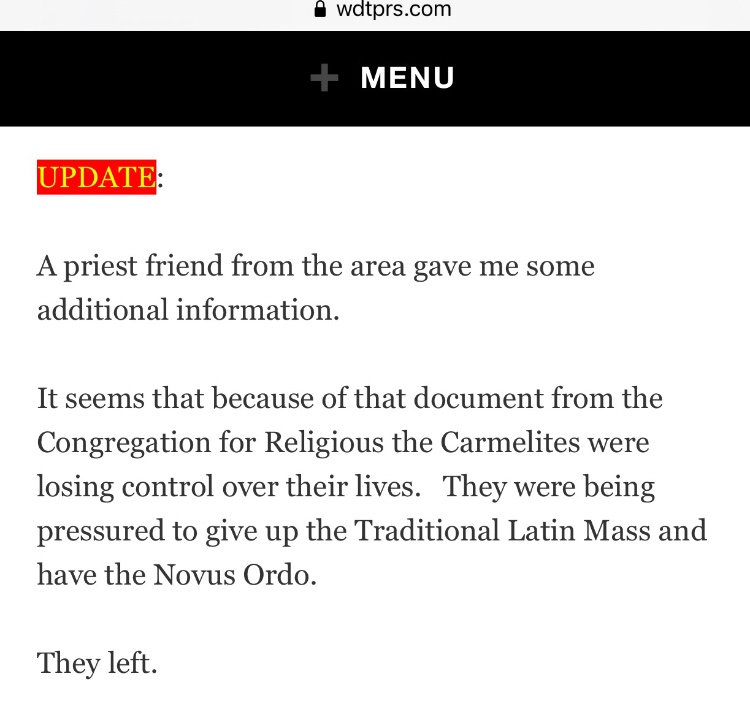
So there you go. New archbishop, new rules, Traditional nuns no longer welcome in the archdiocese. I just asked the communications director for a statement for the second time. I wonder what their standards are for diversity and inclusion, you know?
Because guess who is totally welcomed in the archdiocese?

And the FSSP better watch out, because you can’t have the TLM without a lot of kneeling. The archbishop HATES kneeling.
I only know one thing about new Philly Archbishop Nelson Jesus Perez
He banned kneeling at Mass in the Diocese of Cleveland last year. HERE
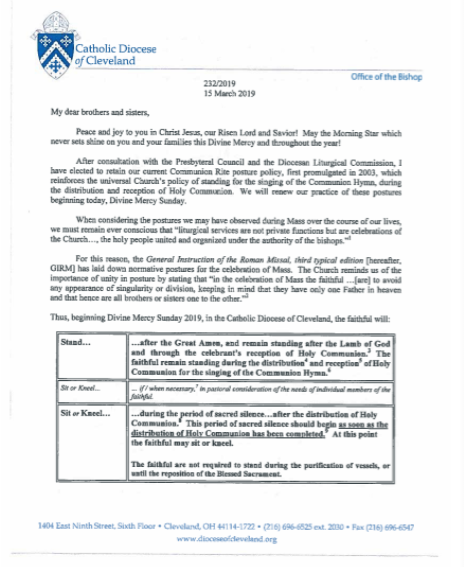

Philly archdiocese ends busy week with multiple press releases to concerned faithful
UPDATE 16:49 MST 16 April 2021: Scroll to bottom.
Priorities…

http://Archphila.org/category/press-releases/
Still not a peep about 15 Discalced Carmelites fleeing the archdiocese for Nebraska, even after multiple requests directly to the head of the communications office.
To be fair, I have received multiple comments/messages that there may be trouble inside the order: A power struggle between confederated houses. It’s likely there are multiple factors in play here, with some within the order and the diocese wanting to enforce Cor Orans, the thermonuclear war on Contemplatives instituted by antipope Bergoglio.
There is also this:

UPDATE: The archdiocese finally responded to my two email inquiries on the situation. A short interaction took place. I paste it all here without comment:
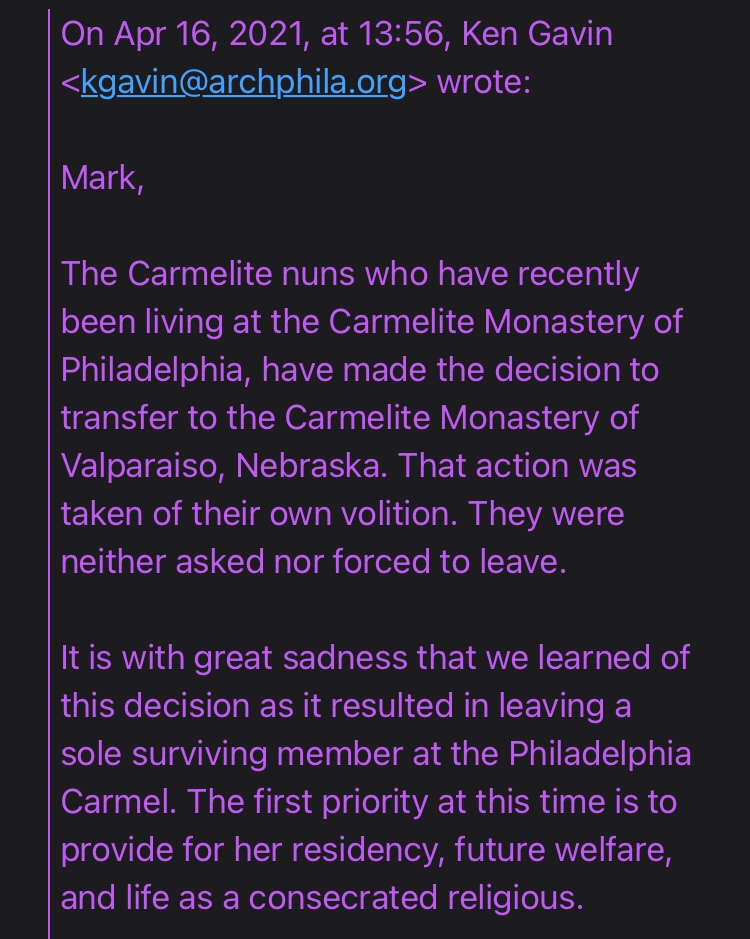

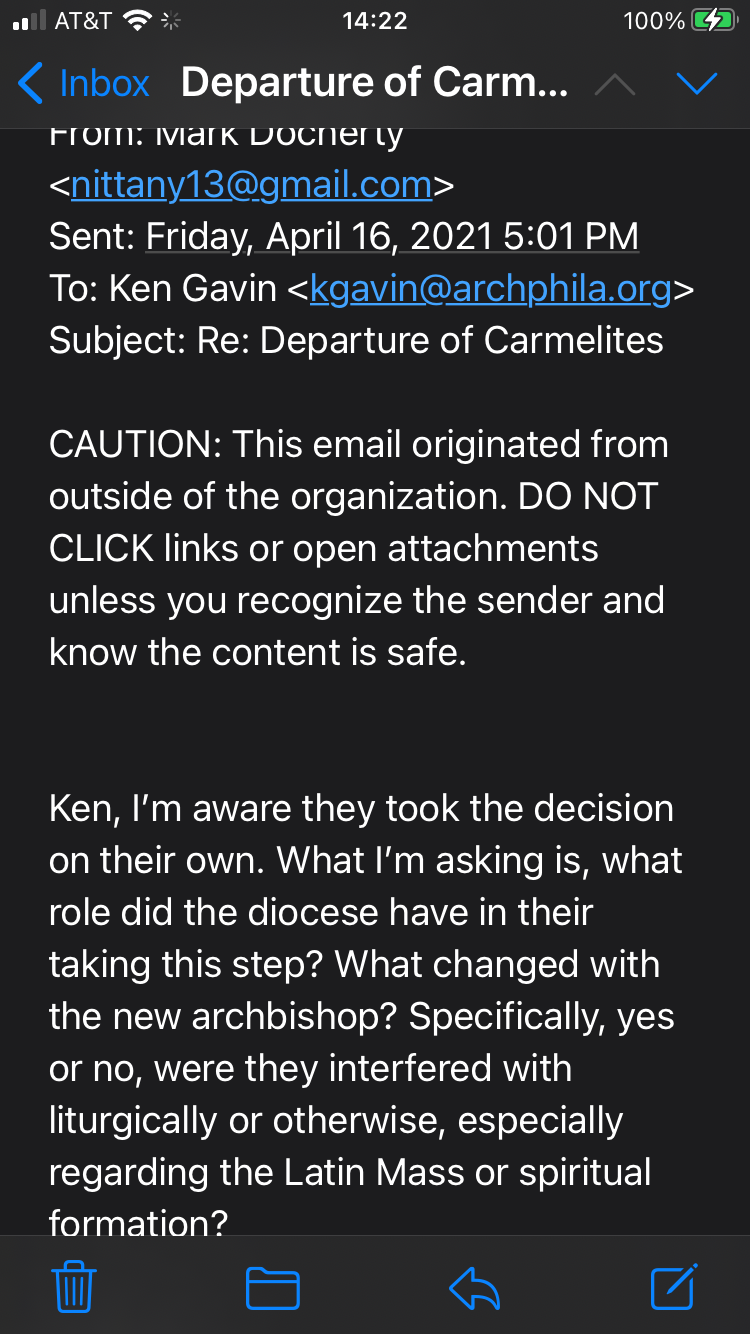

58% of Doctors in the Association of American Physicians and Surgeons are NOT “Vaccinated”
By J.D. Rucker
“Follow the science,” they say.
“The vaccines are totally safe so disregard the dozens of articles per day claiming there are any significant negative reactions,” they say.
“Listen to the doctors,” they say.
Listen to the doctors. Okay. How about THESE doctors:
Of the 700 physicians responding to an internet survey by the Association of American Physicians and Surgeons (AAPS), nearly 60 percent said they were not “fully vaccinated” against COVID.
This contrasts with the claim by the American Medical Association that 96 percent of practicing physicians are fully vaccinated. This was based on 300 respondents.
Neither survey represents a random sample of all American physicians, but the AAPS survey shows that physician support for the mass injection campaign is far from unanimous.
“It is wrong to call a person who declines a shot an ‘anti-vaxxer,’” states AAPS executive director Jane Orient, M.D. “Virtually no physicians are ‘anti-antibiotics’ or ‘anti-surgery,’ whereas all are opposed to treatments that they think are unnecessary, more likely to harm than to benefit an individual patient, or inadequately tested.”
The AAPS survey also showed that 54 percent of physician respondents were aware of patients suffering a “significant adverse reaction.” Of the unvaccinated physicians, 80 percent said “I believe risk of shots exceeds risk of disease,” …
LA Times: Vaccine experts having second thoughts about rushing to inoculate kids
By MELISSA HEALY JUNE 18, 2021
From the earliest days of the pandemic, doctors and public health officials have seen widespread vaccination as the most effective way to stop COVID-19 in its tracks. But a growing contingent of medical experts is now questioning whether that conventional wisdom ought to apply to children.
Their doubts are not borne of conspiracy beliefs, but couched in the carefully calibrated language of risk and benefit. And they’re expected to get a public airing next week as advisors to the Centers for Disease Control and Prevention ponder a spate of post-vaccine heart problems in adolescents and young adults.
…
The FDA authorized the Pfizer-BioNTech vaccine for emergency use in adolescents as young as 12 on May 10. In the weeks that have followed, the safety monitoring systems managed by the FDA and CDC detected dozens of cases of a possible side effect in newly vaccinated teens: an inflammation of the heart muscle known as myocarditis.
The cases typically developed in older adolescents, most of them boys, three to four days after they got a second dose…
(Reminder, all of the vaccines are unapproved and experimental)
